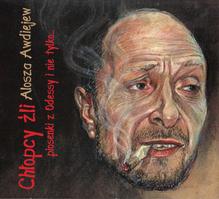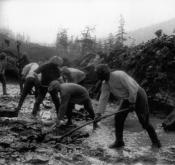На Молдаванке музыка играет,
Кругом веселье пьяное шумит,
А за столом доходы пропивает
Пахан Одессы - Костя-инвалид.
Сидит пахан в отдельном кабинете,
Марусю поит розовым винцом,
А, между прочим, держит на примете
Её вполне красивое лицо.
Он говорит, закуску подвигая,
Вином и матом сердце горяча:
"Послушай, Маша, девка дорогая!
Мы пропадём без Кольки-ширмача.
Живёт ширмач на Беломорканале,
Толкает тачку, стукает кайлой,
А фраера вдвойне богаче стали,
Кому же взяться опытной рукой?
Съезжай, Маруся, милая, дотуда!
И обеспечь фартовому побег.
И торопись, кудрявая, покуда
Не запропал хороший человек."
Маруся едет в поезде почтовом,
И вот она у лагерных ворот.
А в это время зорькою бубновой
Идёт весёлый лагерный развод.
Выходит Колька в кожаном реглане,
В липье военной, яркий блеск сапог.
В руках он держит разные бумаги,
А на груди - ударника значок.
"Ох, здравствуй, Маша, детка дорогая!
Привет Одессе, розовым садам!
Скажи ворам, что Колька вырастает
Героем трассы в пламени труда.
Ещё скажи: он больше не ворует,
Блатную жизнь навеки завязал,
Он понял жизнь здесь новую, другую,
Которую дал Беломорканал.
Прощай же, Маша, девка дорогая,
Одессе-маме передай привет!"
И вот уже Маруся на вокзале
Берёт обратный литерный билет.
На Молдаванке музыка играет,
В пивной веселье пьяное шумит,
Маруся рюмку водки наливает,
Пахан такую речь ей говорит:
"У нас, жулья, суровые законы,
И по законам этим мы живём,
А если Колька честь свою уронит,
Мы ширмача попробуем пером!"
А в этот день на Беломорканале
Шнопа решила марануть порча,
И рано утром зорькою бубновой
Не стало больше Кольки-ширмача...
Кругом веселье пьяное шумит,
А за столом доходы пропивает
Пахан Одессы - Костя-инвалид.
Сидит пахан в отдельном кабинете,
Марусю поит розовым винцом,
А, между прочим, держит на примете
Её вполне красивое лицо.
Он говорит, закуску подвигая,
Вином и матом сердце горяча:
"Послушай, Маша, девка дорогая!
Мы пропадём без Кольки-ширмача.
Живёт ширмач на Беломорканале,
Толкает тачку, стукает кайлой,
А фраера вдвойне богаче стали,
Кому же взяться опытной рукой?
Съезжай, Маруся, милая, дотуда!
И обеспечь фартовому побег.
И торопись, кудрявая, покуда
Не запропал хороший человек."
Маруся едет в поезде почтовом,
И вот она у лагерных ворот.
А в это время зорькою бубновой
Идёт весёлый лагерный развод.
Выходит Колька в кожаном реглане,
В липье военной, яркий блеск сапог.
В руках он держит разные бумаги,
А на груди - ударника значок.
"Ох, здравствуй, Маша, детка дорогая!
Привет Одессе, розовым садам!
Скажи ворам, что Колька вырастает
Героем трассы в пламени труда.
Ещё скажи: он больше не ворует,
Блатную жизнь навеки завязал,
Он понял жизнь здесь новую, другую,
Которую дал Беломорканал.
Прощай же, Маша, девка дорогая,
Одессе-маме передай привет!"
И вот уже Маруся на вокзале
Берёт обратный литерный билет.
На Молдаванке музыка играет,
В пивной веселье пьяное шумит,
Маруся рюмку водки наливает,
Пахан такую речь ей говорит:
"У нас, жулья, суровые законы,
И по законам этим мы живём,
А если Колька честь свою уронит,
Мы ширмача попробуем пером!"
А в этот день на Беломорканале
Шнопа решила марануть порча,
И рано утром зорькою бубновой
Не стало больше Кольки-ширмача...
envoyé par Krzysiek Wrona - 11/4/2014 - 13:49
Stalin's White Sea Canal, or Belomor, remains one of the Soviet Union’s most infamous Gulag construction projects. Thousands of prisoners labored in freezing conditions with primitive tools to finish the canal in a mere twenty months from 1931-1933; alongside the locks, the prisoners were supposedly rebuilding their lives.
Draskoczy's new book, Belomor: Criminality and Creativity in Stalin's Gulag, offers a glimpse into the prisoners' daily experiences at Belomor by examining never-before-published archival materials. The talk will highlight Odessa, the Jewish "City of Thieves," by looking at the criminal song "Music Is Playing in the Moldavanka.” This analysis illuminates the intersection of criminality, creativity, and ideology that was emblematic of the Belomor experience.
Source
Draskoczy's new book, Belomor: Criminality and Creativity in Stalin's Gulag, offers a glimpse into the prisoners' daily experiences at Belomor by examining never-before-published archival materials. The talk will highlight Odessa, the Jewish "City of Thieves," by looking at the criminal song "Music Is Playing in the Moldavanka.” This analysis illuminates the intersection of criminality, creativity, and ideology that was emblematic of the Belomor experience.
Source
Langue: polonais
Versione polacca di Alosza Awdiejew
Dall'album "Chłopcy źli. Piosenki z Odessy i nie tylko"[1999]
Testo da tekstowo.pl/
Sito ufficiale

Dall'album "Chłopcy źli. Piosenki z Odessy i nie tylko"[1999]
Testo da tekstowo.pl/
Sito ufficiale

NA MOŁDAWIANCE
Na Mołdawiance gra muzyczka rzewna,
Tam Wańka Kulas swój wydaje bal,
Na Mańkę patrzy piękną, jak królewna,
Przy stole liczy zagarnięty szmal.
I mówi do niej nalewając winko,
Tak jak się mówi do wytwornych dam:
Posłuchaj Mańka, piękna ma dziewczynko,
Meliniarz Kolka przydałby się nam.
Kibluje Kolka w Biełomorkanale,
Łopatą macha, jak ostatni cieć,
A czasy tutaj mamy niezłe wcale
I szmal z frajerów łatwo można drzeć.
A więc wyruszaj, Mańka, tam do niego,
By pomóc Kolce szybciej stamtąd wyjść
I śpiesz się, by nie stało się coś złego,
Nie musiał biedny Kolka ziemi gryźć.
Więc jedzie Mańka dniami i nocami,
By jak najprędzej bliżej Kolki być
I wcześnie rano czeka tam przy bramie,
Którędy Kolka ma do pracy iść.
Wychodzi Kolka w płaszczu z pagonami
I myśli Mańka, że na jawie śni,
Bo trzyma Kolka teczkę z papierami,
Na piersi jego Order Pracy lśni.
Ach, zdrawstwuj, Mańka, tęsknisz, mam nadzieję,
Odessę pozdrów i nie martw się tak,
Bo Kolka twój nie będzie już złodziejem,
On tutaj w pracy pojął życia smak!
Na Mołdawiance gra muzyczka rzewna,
Tam Wańka Kulas swój wydaje bal,
Na Mańkę patrzy piękną, jak królewna
I do złodziei swój kieruje żal.
Złodzieje, Mania, to są twardzi ludzie
I według twardych reguł muszą żyć,
A jeśli Kolka honor swój zabrudził,
To własną krwią tę plamę musi zmyć.
W tym samym dniu na Biełomorkanale
Swych kumpli szukał jakiś ciemny zbój
I kiedy słońce wstało w pełnej chwale
Meliniarz Kolka żywot skończył swój.
Na Mołdawiance gra muzyczka rzewna,
Tam Wańka Kulas swój wydaje bal,
Na Mańkę patrzy piękną, jak królewna,
Przy stole liczy zagarnięty szmal.
I mówi do niej nalewając winko,
Tak jak się mówi do wytwornych dam:
Posłuchaj Mańka, piękna ma dziewczynko,
Meliniarz Kolka przydałby się nam.
Kibluje Kolka w Biełomorkanale,
Łopatą macha, jak ostatni cieć,
A czasy tutaj mamy niezłe wcale
I szmal z frajerów łatwo można drzeć.
A więc wyruszaj, Mańka, tam do niego,
By pomóc Kolce szybciej stamtąd wyjść
I śpiesz się, by nie stało się coś złego,
Nie musiał biedny Kolka ziemi gryźć.
Więc jedzie Mańka dniami i nocami,
By jak najprędzej bliżej Kolki być
I wcześnie rano czeka tam przy bramie,
Którędy Kolka ma do pracy iść.
Wychodzi Kolka w płaszczu z pagonami
I myśli Mańka, że na jawie śni,
Bo trzyma Kolka teczkę z papierami,
Na piersi jego Order Pracy lśni.
Ach, zdrawstwuj, Mańka, tęsknisz, mam nadzieję,
Odessę pozdrów i nie martw się tak,
Bo Kolka twój nie będzie już złodziejem,
On tutaj w pracy pojął życia smak!
Na Mołdawiance gra muzyczka rzewna,
Tam Wańka Kulas swój wydaje bal,
Na Mańkę patrzy piękną, jak królewna
I do złodziei swój kieruje żal.
Złodzieje, Mania, to są twardzi ludzie
I według twardych reguł muszą żyć,
A jeśli Kolka honor swój zabrudził,
To własną krwią tę plamę musi zmyć.
W tym samym dniu na Biełomorkanale
Swych kumpli szukał jakiś ciemny zbój
I kiedy słońce wstało w pełnej chwale
Meliniarz Kolka żywot skończył swój.
envoyé par Krzysiek Wrona - 11/4/2014 - 17:21
Langue: français
Versione francese di Dina Vierny
dal libretto del disco di Noemi Wasfield & BLK
dal libretto del disco di Noemi Wasfield & BLK
ODESSA
A Odessa dans un quartier malfamé,
Dans la brasserie, la musique joue.
Partout, l'ivresse et la gaieté,
Attablé, buvant ses revenus,
Est assis le roi de la pègre d'Odessa,
Constantin l'Invalide.
Le roi de la pègre est installé
Dans un cabinet particulier.
Il offre du vin rosé à Maroussia,
Et entre autres, lorgne
Sur son assez joli visage
Il dit, poussant vers elle les plats,
Par le vin et les jurons s'échauffant le coeur :
Ecoute, Macha, chère enfant,
Nous serons fichus sans Kolka Chermatch
Le Chermatch habite sur le "Belomor canal",
Il pousse la brouette, il frappe le sol du piolet,
Et les "Pigeons" sont devenus deux fois plus riches,
Qui pourrait prendre l'affaire d'une main compétente.
Maroussia ma chère, vas-y,
Et tâche de m'obtenir la victoire,
Et dépêche toi, ma frisée, pour ne pas
Que se perde un "homme" bien.
Maroussia part en train postal,
Et la voilà déjà aux portes du camp.
En même temps à l'aube, joyeusement,
Du camp, on part au travail
Kolka sort dans un vêtement de cuir,
Tenue militaire, les bottes brillantes, cirées.
Dans la main il tient toutes sortes de papiers
Et sur la poitrine l'insigne des héros du travail.
Oh bonjour Macha, chère enfant,
Bonjour à Odessa, à ses jardins roses.
Dis aux voleurs que Kolka a grandi,
Héros de la route, dans les flammes de l'effort.
Dis-leur aussi qu'il ne vole plus,
La vie en marge, il l'a remise à jamais.
Il a compris ici une autre vie, nouvelle,
Que lui a donné le camp de Belomor canal.
Adieu, Macha, enfant chérie,
Transmets mon salut à Odessa notre mère.
Et voilà déjà Maroussia à la gare,
Elle prend un billet pour un train de voyageurs.
Dans le quartier malfamé, la musique joue,
Dans la brasserie, la gaieté, l'ivresse sont bruyantes.
Maroussia se verse un verre de vodka,
Le roi de la pègre lui tient le discours suivant :
Nous les malfrats avons des lois sévères
Et suivant ces lois nous vivons.
Si Kolka a perdu son honneur,
Nous allons le châtier de première.
Et ce jour-là, au camp de Belomor canal,
Les hommes décidèrent de supprimer le voleur gâché,
Et à l'aube écarlate,
Kolka n'a plus figuré parmi les vivants
A Odessa dans un quartier malfamé,
Dans la brasserie, la musique joue.
Partout, l'ivresse et la gaieté,
Attablé, buvant ses revenus,
Est assis le roi de la pègre d'Odessa,
Constantin l'Invalide.
Le roi de la pègre est installé
Dans un cabinet particulier.
Il offre du vin rosé à Maroussia,
Et entre autres, lorgne
Sur son assez joli visage
Il dit, poussant vers elle les plats,
Par le vin et les jurons s'échauffant le coeur :
Ecoute, Macha, chère enfant,
Nous serons fichus sans Kolka Chermatch
Le Chermatch habite sur le "Belomor canal",
Il pousse la brouette, il frappe le sol du piolet,
Et les "Pigeons" sont devenus deux fois plus riches,
Qui pourrait prendre l'affaire d'une main compétente.
Maroussia ma chère, vas-y,
Et tâche de m'obtenir la victoire,
Et dépêche toi, ma frisée, pour ne pas
Que se perde un "homme" bien.
Maroussia part en train postal,
Et la voilà déjà aux portes du camp.
En même temps à l'aube, joyeusement,
Du camp, on part au travail
Kolka sort dans un vêtement de cuir,
Tenue militaire, les bottes brillantes, cirées.
Dans la main il tient toutes sortes de papiers
Et sur la poitrine l'insigne des héros du travail.
Oh bonjour Macha, chère enfant,
Bonjour à Odessa, à ses jardins roses.
Dis aux voleurs que Kolka a grandi,
Héros de la route, dans les flammes de l'effort.
Dis-leur aussi qu'il ne vole plus,
La vie en marge, il l'a remise à jamais.
Il a compris ici une autre vie, nouvelle,
Que lui a donné le camp de Belomor canal.
Adieu, Macha, enfant chérie,
Transmets mon salut à Odessa notre mère.
Et voilà déjà Maroussia à la gare,
Elle prend un billet pour un train de voyageurs.
Dans le quartier malfamé, la musique joue,
Dans la brasserie, la gaieté, l'ivresse sont bruyantes.
Maroussia se verse un verre de vodka,
Le roi de la pègre lui tient le discours suivant :
Nous les malfrats avons des lois sévères
Et suivant ces lois nous vivons.
Si Kolka a perdu son honneur,
Nous allons le châtier de première.
Et ce jour-là, au camp de Belomor canal,
Les hommes décidèrent de supprimer le voleur gâché,
Et à l'aube écarlate,
Kolka n'a plus figuré parmi les vivants
Langue: anglais
Versione inglese di Jeremy Grant e Laurent d'Aumale
dal libretto del disco di Noemi Wasfield & BLK

dal libretto del disco di Noemi Wasfield & BLK

Noemi Waysfeld
ODESSA
In Odessa, in a disreputable neighbourhood,
In a bar, music is playing
Drunkenness and mirth are all around.
Sitting at a table, drinking away his earnings,
Is the king of odessa's underworld
Konstantin the cripple
The king of the underworld made himself comfortable
In a separate booth.
He pours marusia a glass of rosé wine,
And leers at her rather pretty face, among others.
He says, pushing dishes in her direction,
His heart emboldened by wine and swearing:
Look macha dear, my dearest child,
Without kolka chermatch we'll be done for.
This chermatch lives on belomor canal
He pushes the wheelbarrow, strikes the earth with an pick axe
And the «pigeons» have become twice as rich
Who else can pull it off, but the competent chermatch?
You've got to go, my dear marussia,
Go and bring me victory,
And hurry up, you curly-haired girl,
So a good man like chermatch isn't wasted.
Marussia takes the postal train,
And soon she arrives at the camp gates,
At the same moment, at dawn, merrily,
Everyone's off to the construction site.
Kolka comes out in a leather suit,
With a military coat and shiny boots on.
He is carrying all sorts of papers in his hand,
And the worker heroes' medal on his chest
Oh hello Macha, dear child,
Say hello to Odessa, to its green gardens,
Tell all the thieves that Kolka is making a man of himself,
A hero of road construction, in the flames of toil.
Tell them, too, that he steals no more,
That he has left the underworld once and for all,
He has found a different, a new life here,
Given him by the Belomor Canal Camp
Farewell Macha, my dearest child,
Please pay my respects to our Mother Odessa,
And soon Marussia is back at the station
And buys a ticket for a passenger train
In a disreputable neighbourhood, music is playing
In a bar, loud with mirth and drunkenness,
Marussia pours herself a drink of vodka,
The king of the underworld speaks to her:
We bandits obey strict laws,
And live accordingly.
If Kolka has lost his honour,
We'll punish him all right.
And on that day at the Belomor Canal Camp
The men decided to kill the wasted thief,
And at the scarlet dawn,
Kolka Chermatch lived no more.
In Odessa, in a disreputable neighbourhood,
In a bar, music is playing
Drunkenness and mirth are all around.
Sitting at a table, drinking away his earnings,
Is the king of odessa's underworld
Konstantin the cripple
The king of the underworld made himself comfortable
In a separate booth.
He pours marusia a glass of rosé wine,
And leers at her rather pretty face, among others.
He says, pushing dishes in her direction,
His heart emboldened by wine and swearing:
Look macha dear, my dearest child,
Without kolka chermatch we'll be done for.
This chermatch lives on belomor canal
He pushes the wheelbarrow, strikes the earth with an pick axe
And the «pigeons» have become twice as rich
Who else can pull it off, but the competent chermatch?
You've got to go, my dear marussia,
Go and bring me victory,
And hurry up, you curly-haired girl,
So a good man like chermatch isn't wasted.
Marussia takes the postal train,
And soon she arrives at the camp gates,
At the same moment, at dawn, merrily,
Everyone's off to the construction site.
Kolka comes out in a leather suit,
With a military coat and shiny boots on.
He is carrying all sorts of papers in his hand,
And the worker heroes' medal on his chest
Oh hello Macha, dear child,
Say hello to Odessa, to its green gardens,
Tell all the thieves that Kolka is making a man of himself,
A hero of road construction, in the flames of toil.
Tell them, too, that he steals no more,
That he has left the underworld once and for all,
He has found a different, a new life here,
Given him by the Belomor Canal Camp
Farewell Macha, my dearest child,
Please pay my respects to our Mother Odessa,
And soon Marussia is back at the station
And buys a ticket for a passenger train
In a disreputable neighbourhood, music is playing
In a bar, loud with mirth and drunkenness,
Marussia pours herself a drink of vodka,
The king of the underworld speaks to her:
We bandits obey strict laws,
And live accordingly.
If Kolka has lost his honour,
We'll punish him all right.
And on that day at the Belomor Canal Camp
The men decided to kill the wasted thief,
And at the scarlet dawn,
Kolka Chermatch lived no more.
×
![]()









Tradizionale
Dall'album "Блатные песни"
Sotto il titolo "Одесса" (Odessa)
Testo da http://www.shansonprofi.ru/
Una canzone popolare russa dedicata a Kolka il borseggiatore che lascia l'"onesta" vita da ladro, ironicamente per lavorare nell'amministrazione del famigerato campo di detenzione di Belomornakal. Quando i ladri di Odessa mandano la bella Mascia a riprenderlo, lui gli manda a dire che "non ruba piu".
City of Rogues and Schnorrers: Russia's Jews and the Myth of Old Odessa